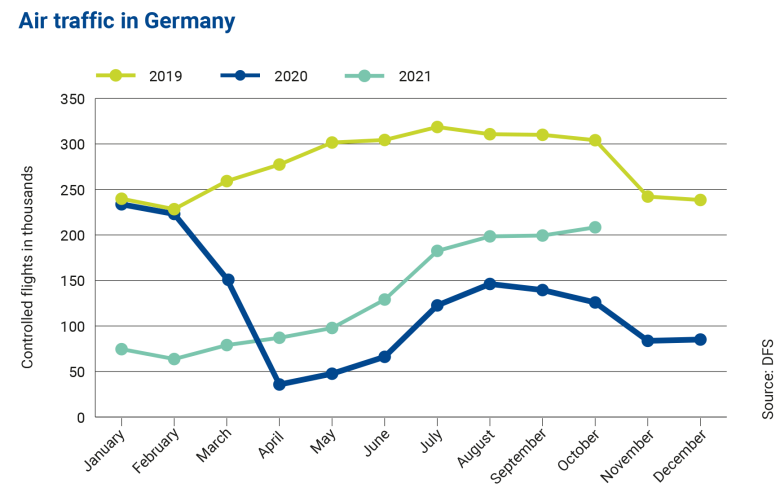
The number of flights in German airspace rose again. With 208,414 flights, the air traffic volume in October 2021 was higher than in the previous month, coming in at more than two thirds of the 2019 traffic level.
After the marked upward trend in the summer months, the volume of air traffic in Germany continued to rise in the autumn. Traffic in September was almost at the same level as the previous month with 199,401 flights, while in October, the school holidays in most Federal States in Germany led to a significant increase in demand for air travel. Overall, DFS, the German air navigation service provider, logged 208,414 flights under its control in October.
Uncharacteristic upswing in autumn
This means that October was the busiest month of 2021 so far, a development which is not typical for this time of the year. Normally, air traffic increases as the year progresses before peaking in the summer months and then decreasing in October. This typical annual traffic pattern was even evident in the crisis year 2020, albeit at a low level.
Overall, traffic volumes in October 2021 were 31.5 percent lower than in the pre-crisis month (September 2021/2019: down 35.7 percent). The picture is different if you look at the whole year. Between January and October 2021, DFS recorded a total of 1.32 million flights. This is still less than half the number of flights that used German airspace in the same period before the pandemic (January to October 2019: 2.85 million flights).
Cargo airports shrug off the crisis
The situation at German airports in October also showed a continued upward trend. DFS logged a total of 122,304 take-offs and landings at the 15 designated international airports in Germany. Frankfurt Airport was the busiest airport with 29,981 flights. Munich Airport followed in second place with 20,713 take-offs and landings. This is the first time that all 15 airports have reached more than half of their pre-pandemic traffic levels. Overall, the number of take-offs and landings in October was 37.6 percent lower than in the pre-pandemic month of October 2019.
Leipzig Airport is once again almost untouched by the crisis. It recorded 7,073 take-offs and landings in October (October 2019: 7,075), while September's traffic figures were actually 2.4 percent higher than the same month in 2019. This impressively demonstrates the role that cargo transport plays in aviation. This effect can also be seen at Cologne Bonn Airport, which experienced a decline of only 24.4 percent (10,429 flights) compared with 2019.
Downloads
Media contact:
Ute Otterbein
Telephone: +49 (0)6103 / 707-4162
E-mail: presse@dfs.de
DFS Deutsche Flugsicherung GmbH, the German air navigation service provider, is a State-owned company under private law with 5,600 employees as at 30 June 2021. DFS ensures the safe and punctual flow of air traffic over Germany. Around 2,200 air traffic controllers guide more than three million flights through German airspace in peak years, up to 10,000 every day. The company operates control centres in Bremen, Karlsruhe, Langen and Munich as well as control towers at the 15 designated international airports in Germany. The subsidiary DFS Aviation Services GmbH markets and sells products and services related to air navigation services, and provides air traffic control at nine regional airports in Germany and at London Gatwick Airport and Edinburgh Airport in the UK. DFS is working on the integration of drones into air traffic and has set up a joint venture, Droniq GmbH, with Deutsche Telekom. Other subsidiaries include R. Eisenschmidt GmbH, which markets publications and products for general aviation, and Kaufbeuren ATM Training GmbH (KAT), which provides training for military air traffic services personnel. The joint venture FCS Flight Calibration Services GmbH offers flight inspection services.